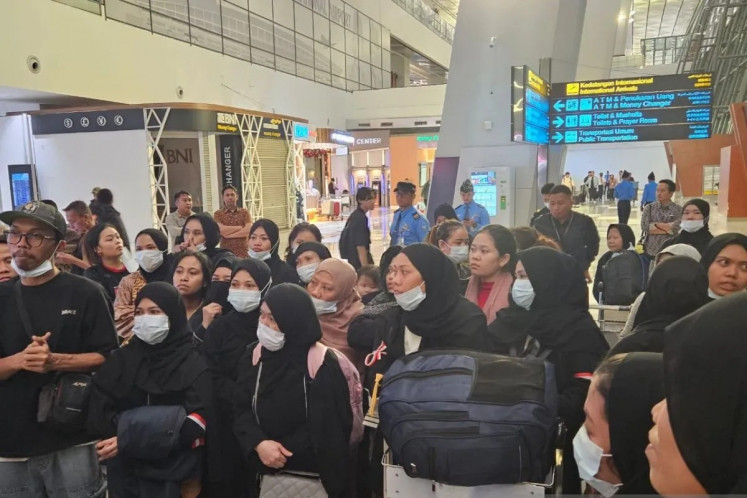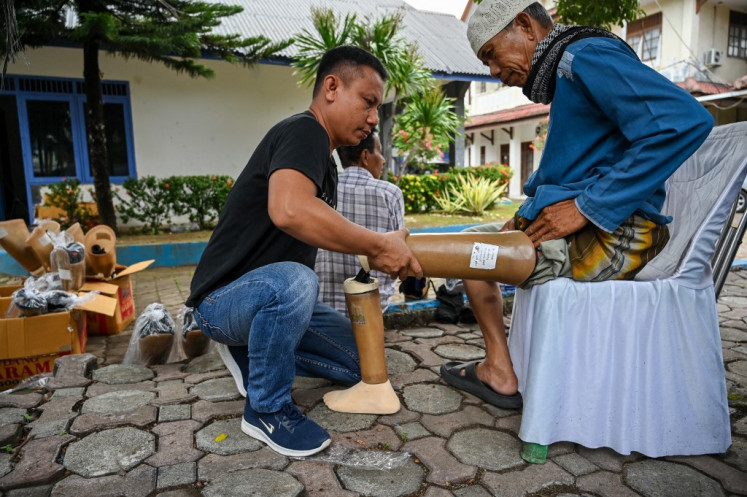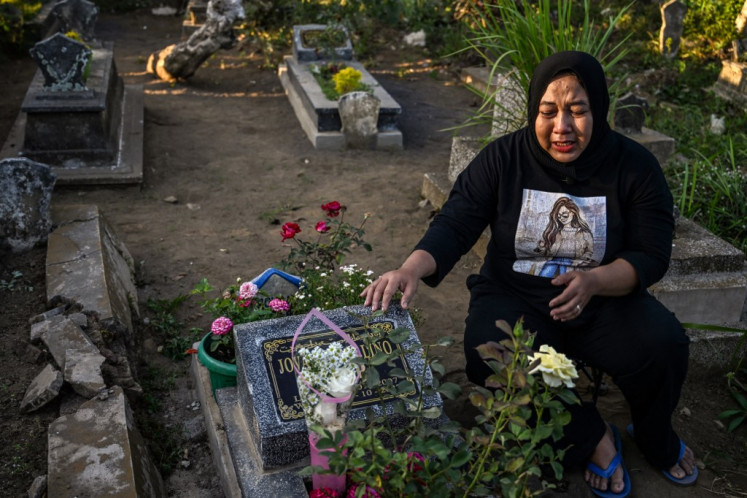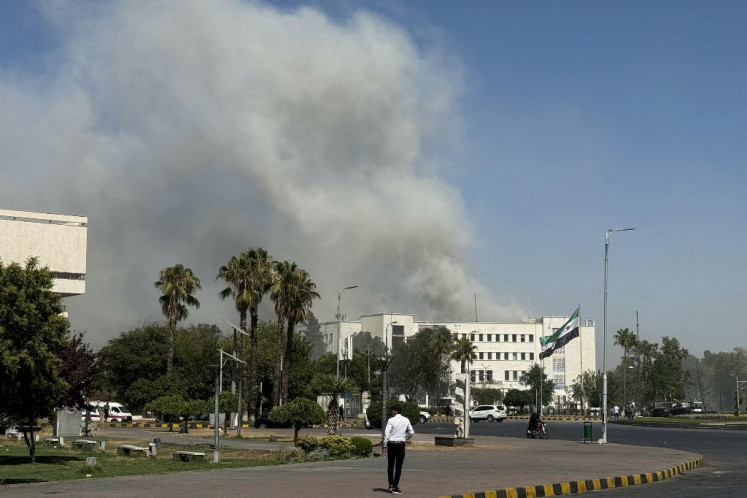Popular Reads
Top Results
Can't find what you're looking for?
View all search resultsPopular Reads
Top Results
Can't find what you're looking for?
View all search resultsWhy we may have lost battle against coronavirus
Change text size
Gift Premium Articles
to Anyone
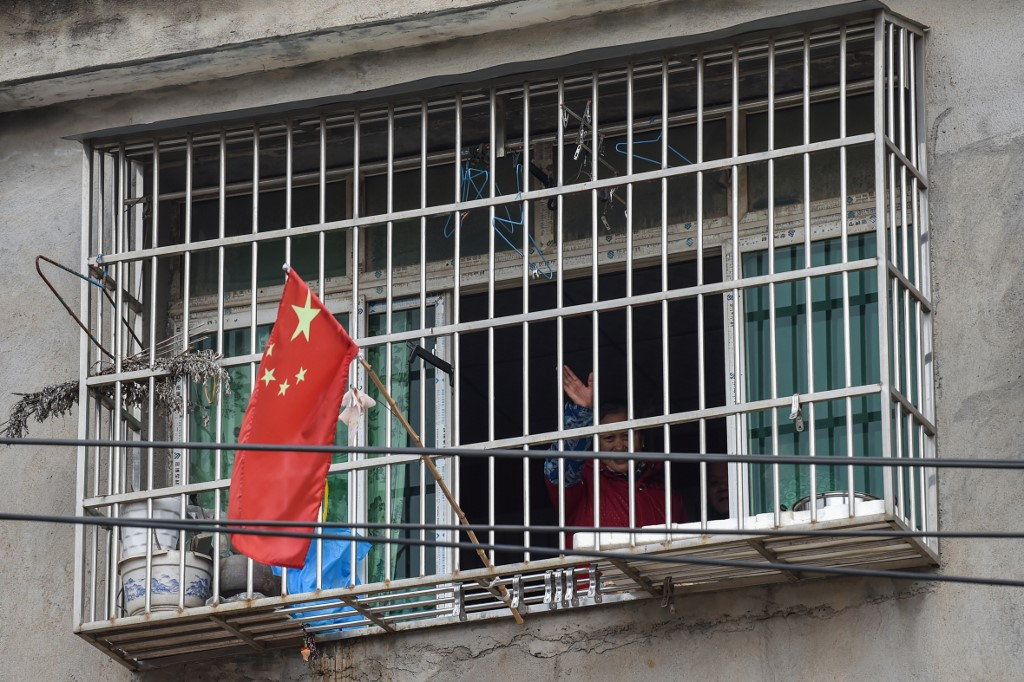 A family looks out the window from their home in a neighborhood on the outskirts of Wuhan in China's central Hubei province on January 27, 2020, amid a deadly virus outbreak which began in the city. - China on January 27 extended its biggest national holiday to buy time in the fight against a viral epidemic and neighbouring Mongolia closed its border, after the death toll spiked to 81 despite unprecedented quarantine measures. (AFP/Hector Retamal)
A family looks out the window from their home in a neighborhood on the outskirts of Wuhan in China's central Hubei province on January 27, 2020, amid a deadly virus outbreak which began in the city. - China on January 27 extended its biggest national holiday to buy time in the fight against a viral epidemic and neighbouring Mongolia closed its border, after the death toll spiked to 81 despite unprecedented quarantine measures. (AFP/Hector Retamal)
A
fter beating the Severe Acute Respiratory Syndrome (SARS) and Middle Eastern Respiratory Syndrome (MERS) epidemics in the past, we may think we will win the battle against the 2019 novel coronavirus (2019-nCoV). But this optimism is turning into pessimism.
First, several developed countries known to have the best infection control in the world have confirmed cases. It started with Japan and South Korea and peaked when the United States announced its first confirmed case on Jan. 21.
Instead of declining, the number of people infected is on the rise. As of Sunday, developed countries like Canada, France and Australia had reported infections. At this stage, the game seems to be over.
The situation at ground zero is even worse. As reported by the John Hopkins University, there were 1,052 confirmed cases and 56 deaths cases in Wuhan, China, alone as of Sunday, while across China the figure has exceeded 2,000 within only three weeks. Worse, Wuhan has gradually lost its ability to defend itself.
Outside China, a new case has been confirmed almost every day in 14 countries. In Indonesia, there has been growing concern about whether the coronavirus epidemic has reached the country, after two suspected cases were reported in Jambi and Bandung, West Java. The patient being treated at Hasan Sadikin Hospital in Bandung has traveled to Wuhan.
Hence, the enemy has arrived in our backyard. The question now is whether the previous SARS and MERS epidemics have taught us any lessons.
The reproductive number (RO) measures how infectious a disease is. According to Maimuna Majumder, an expert from Harvard Medical School, and a 2020 paper by Jonathan M. Read et al, the 2019-nCoV has the highest RO ever recorded. For comparison, the RO for the average flu and SARS are 1.3 and 2.0, respectively, while the RO for the 2019-nCoV can reach 3.8. This explains why the number of confirmed cases is so high.
Indonesian health authorities have too much confidence in using thermal scanners to defend against the 2019-nCoV. It worked for SARS, but this time around it has failed to detect the person from Jambi, who was a returning traveler.
We should remember that we are dealing with a virus that can mutate. First, the virus is an organism known to have a seven to 14 day incubation period. During this period, a carrier does not show any symptoms that can be detected by a thermal scanner. That’s why carriers can pass undetected. Experts say the 2019-nCoV can mutate and has a longer incubation period, making it difficult to detect. The virus is mutating but unfortunately our technology is not up to date.
Maintaining momentum is crucial to dealing with coronavirus infections. Unfortunately, emergency action was not taken immediately on Jan. 1, when 41 cases were reported. The golden period of three weeks passed without any significant action taken, such as quarantines or a travel ban. Measures taken after this golden period may do little to stop the infection from spreading.
The dark side of Wuhan lies in the Huanan market, the center of this epidemic. The 2019-nCoV is assumed to have been transmitted from wild animals sold in the market.
The ongoing epidemic exposes the big picture of China’s health problems. Despite having 5G technology, people in China have maintained a tradition of consuming bushmeat, ranging from camels to bats. The SARS epidemic started from human consumption of civets that were carrying the virus.
As of Sunday, it had been confirmed that 33 out of the 585 samples collected from the market contained the coronavirus. To prevent such epidemics from recurring, not only must the virus be killed but the practice of consuming bushmeat must also be stopped.
Indonesia’s capacity to win the battle against the novel coronavirus is represented by the country’s epidemic preparedness index (EPI) and infectious vulnerability index (IVI). Based on a study by Isaac Bogoch et al, Indonesia, represented by Denpasar, scores 0.563 in the IVI, which is the lowest among the 18 cities across the world surveyed. This is a serious issue considering that Denpasar is the country’s top tourist destination for foreigners.
Furthermore, Ben Oppenheim et al have categorized Indonesia under EPI cluster 3, with vaccination coverage of only 5 percent. These facts serve as a reminder that Indonesia needs to strengthen its arsenal to win the fight against the new coronavirus.
Hopefully, smarting from our mistakes, we can do something to improve our defense against not only the coronavirus but also other viruses that may strike in the future.
***
Lecturer at the School of Public Health, University of Indonesia (UI). The views expressed are his own.





